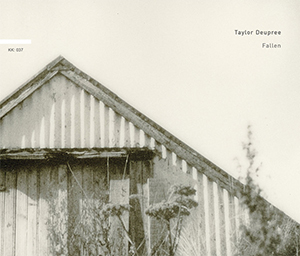 For his first solo album on a label other than his own for quite some time (although 12k and Spekk could almost be siblings in the world of record labels), Fallen features the prolific sound artist turning his focus to beautifully understated sounds to the piano, culminating in eight songs of delicate and pensive tones, with the focus shifting between the pure sounds of the instrument to gorgeous production and back again.
For his first solo album on a label other than his own for quite some time (although 12k and Spekk could almost be siblings in the world of record labels), Fallen features the prolific sound artist turning his focus to beautifully understated sounds to the piano, culminating in eight songs of delicate and pensive tones, with the focus shifting between the pure sounds of the instrument to gorgeous production and back again.
On many parts of Fallen, Deupree lets the piano do most of the proverbial talking, though things never are that simple.Initially intended to be a solo piano record, Deupree ended up expanding his palette and introduced synths and guitar as well, though the primary instrument is largely the focus.For the opening song, "The Lost Sea," sparse notes spring up from a bed of pleasant analog hiss, resulting in just enough distortion and sonic grime to increase the sense of complexity, with the sounds between the notes carrying just as much weight as the piano itself.There is an almost natural sense of processing to the sound of "Sill," a composition that is simultaneously imposing and delicate, building to a rainstorm like roar at its conclusion.
A warm, inviting analog space encapsulates the layers of "Paper Dawn," a piece that features less processing but no less complexity, resulting in a Spartan, but also delicate mood.The synth opening contributes to a less distinct but no less gorgeous mass of tone and texture, but eventually the piano appears, and commandingly so.From there on, the natural and processed sounds coexist splendidly, culminating in a conclusion of tape wobble and gentle fade.In a similar dynamic, "For These in Winter" is at first a clattering of what could be pots and pans in a kitchen, before Deupree blends in a bit of complex notes and piano performance.
A song such as the expansive "Unearth" is a high water mark on an album with many memorable moments.First a composition of shimmering, expanding piano notes, there is an added dimension from some droning low end rumble and richer processing in instrumentation that keeps its subtlety but dynamically expands, ending on a memorable repetitive set of loops.The more significant processing to piano throughout "Small Collisions" also makes it remarkable, blended with a multifaceted buzz and repetitive, yet complicated interference-like electrical hum to give it a notable sense of depth.
Album closer "Duskt" is the perfect conclusion for the disc, acting as a culmination of what preceded it.From beginning to end, it sounds like Deupree’s taped performance is quickly decaying away.The notes shimmer, but each pass sounds as if more and more of the magnetic material of the master tape is flaking away, fragmenting the sound and adding additional distortion.That distortion builds and swells consistently, finally hitting a peak before then falling away to end the album on a peaceful, very analog note.
Fallen is a brilliant record in its own right, but part of the allure of Taylor Deupree's work is analyzing exactly how he managed to get the sounds he does.Both as a composer and mastering engineer, his technological skills in the realm of production are unquestionably genius, but I know he is just as likely to record the sound of a thrift store toy keyboard as he is a gigantic modular rig.So when I listen to the aforementioned "Duskt" I cannot help but wonder if what I am hearing is the result of a complex chain of digital signal processing and treatments or if he actually did just record a performance on a tape that was buried in his back yard for two years via a malfunctioning four track machine.Never being able to know the truth is, of course, part of the magnificence of his work, and one that kept me revisiting Fallen.
samples:
 
Read More

